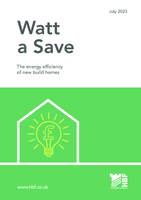New homes save buyers £135 a month – HBF

The Home Builders Federation is calling upon government to work
with lenders to create a “proper market” for green mortgages, as its latest
research shows that new build home owners will continue to save an average of
£135 a month under Ofgem’s new price cap.
HBF’s updated Watt a Save July 2023
report reveals that further savings are made when comparing new build houses to
their older counterparts, with average monthly running costs reportedly £183
cheaper.
The report, based on an analysis of government Energy
Performance Certificate (EPC) data for the year to March 2023, finds that 85%
of new build properties achieve an A or B EPC – the highest performing levels –
while only 4% of older homes attain this.
According to the government’s data, new homes use 55% less
energy and 60% less carbon than older properties. HBF said these findings
demonstrated the advantages of modern building practices, technology and
products, “and industry’s commitment to greener, environmentally conscious
construction”.
And new homes, the data shows, help reduce the UK’s carbon
emissions by 500,000 tonnes a year.
HBF said that while housebuilders continued to rapidly
adjust to net zero targets, the government needed to work with lenders to offer
incentives for buyers of energy saving homes, establishing a “proper market for
green mortgages” given the mortgage market “squeeze”.
Currently, HBF explained, most mortgage affordability
assessments were based on the same assumptions of energy bills, even though
EPCs provided an indication of household running costs. Lenders would therefore
routinely apply the same assumed monthly expenditure to households, no matter
what the home’s level of energy performance.
HBF said: “This is a missed opportunity to offer improved
mortgage deals that incentivise environmentally conscious and long-term
money-saving buying decisions, which would also support the next generation to
realise their home ownership ambitions.”
HBF also warned that with the 2025 Future Homes Standard
(FHS) drawing closer, government must also act to ensure a supply chain and
skilled workforce to support “ever more technologically-advanced and
energy-efficient new homes”.
The report, which also examines the performance of homes being
built to the increasingly rigorous standards of the new Part L and the FHS,
estimates that new homes built to the updated Part L will produce 71% less
carbon than the average older property.
Neil Jefferson, HBF’s md, said: “The action industry is taking
to continually improve the energy and carbon efficiency of new homes is
contributing significantly towards government’s net zero action plan and
helping to ease the mounting pressures on household incomes across the country.
“As mortgage affordability gets tougher, rental costs
increase and the country’s need for homes grows increasingly desperate, lenders
and government must review affordability assessments in consideration of these
numbers to support more people to get onto the housing ladder.
“Meanwhile, if government is serious about delivering the
number of homes the country needs and achieving against its environmental
commitments, nationwide investment in skills programmes, retraining and
apprenticeships is essential.”
Read this article on our website Click here
|
Housebuilder news alerts are sponsored by

|
|
Housebuilder Media Ltd
Ground Floor
HBF House
27 Broadwall
London
SE1 9PL
Housebuilder Media Limited Registered Office: 27 Broadwall, London, SE1 9PL
Company registration no. 01952317 Registered in England
|
|
|